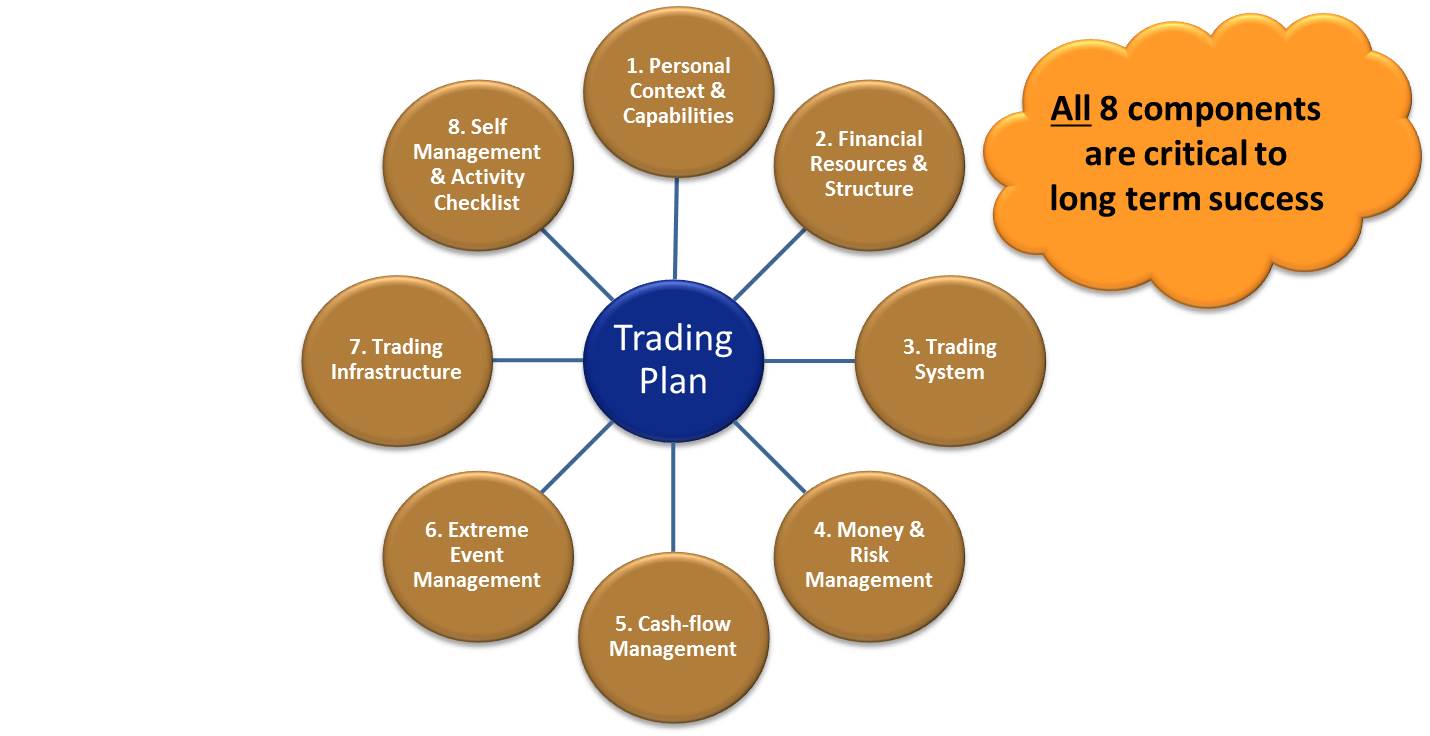Trading plans - what is the big deal?
Yes I know…writing trading plans just isn't that important, you just want to get started and make some money, you don’t need to laboriously document everything. As least this is what the 95% of traders who FAIL will be saying right now.
Believe me when I say that this is one of THE BIGGEST determinants of success in
trading. If your plan is not documented you will not succeed long term. Don’t be
one of the 95% of traders that lose money - write a good trading plan and watch
how much clarity you gain.
What do good trading plans look like?
Trading plans are the equivalent of a business plan that you would write if you were starting a traditional business. Businesses without a solid business plan fail…so do traders without trading plans.
Before I get into the detail, it is important to realize that your plan will be developed over time. Some of the explanation and suggestions below may seem overwhelming – but you don’t have to cover all of these components on day one. The most important thing is to realize that you need a written plan and to actually start writing it.
Your plan should detail everything that you need to know to run your trading business from how you generate your trades to placing orders, to what you will do in the case of a market crash or a natural disaster that halts all trading…at the extreme end you my even cover what should happen in the event of your death – your heirs will be grateful for clear instructions on how to continue profiting from your trading business!
A good trading plan defines exactly how you trade
and what to do under all possible scenarios
This will be a working document that you will add to and evolve over time. Ultimately it should be something that you could give to someone and they should then be able to follow your instructions and run your trading business for you.
With a good plan to follow, someone else
should be able to run your trading business for you!
Why do you need a Trading Plan?
Trading is one of the most challenging professions you could pursue. Traders that survive and prosper over the long term are prepared for any eventuality. When something happens in the market that they have not previously experienced, they already know how they will react to protect their account and generate a profit.
If your plan doesn’t describe what you will do under a wide range of scenarios you will find yourself making trading decisions under uncertainty during the trading day. This is the most dangerous situation for a system trader because poor decisions are highly likely under extreme conditions.
These extreme situations may be infrequent, but survive long enough and you will experience them too. Our hope is that you have a written plan that guides your actions so that you can survive, and even prosper during these situations in the future.
What should a trading plan include?
Your plan will be built over time and should ultimately aim to include everything that you need to run your trading business. Any situation that could come up in the markets should be covered.
This sounds a little daunting, so let’s break it down and give you some specific example questions to answer in your plan. There are 8 components in a complete trading plan:
(This is not exhaustive, and you should take this as a starting point from which to build your plan)
1. Personal Context and Capabilities:
- What is my ideal life and what will your trading bring me?
- What skills do I bring to my trading business?
- What is my personality profile and how will it impact my trading?
- ...
2. Financial Resources:
- What is my financial situation and how does trading fit into this?
- How much risk capital can I devote to my trading business?
- How will trading fit in / interact with my other investing activities?
- ...
3. Trading System:
- What are my trading system objectives?
- What Trading Strategy best suits me?
- What are my Trading System Rules?
- ...
4. Money and risk management:
- How will I determine the position size for each trade?
- How many trades will I have open at any one time?
- How will I allocate capital across my portfolio of systems?
- ...
5. Cash Flow Management
- Do I need to take regular cash flow out of my trading account?
- How will I manage any expenses relating to my trading activity?
- How will I add cash to my trading account?
- ...
6. Extreme events:
- What will I do if I have a personal traumatic experience?
(e.g. birth / deaths / marriages / losing your job / sickness / car accident etc) - What should happen if I suffer death or permanent incapacity?
- What will I do if a war breaks out?
- ...
7. Trading Infrastructure
- What trading system software will I use to develop and optimize my trading systems?
- What market data service will I use? What backup provider will I use?
- What computer and other hardware will I use to run my trading program?
- ...
8. Self Management & Activity Checklist
- How will I assess my mental state before making any trading decisions?
- What will I do if my mental state is not strong and positive?
- What is my daily trading routine?
- ...
While I certainly haven't provided all the questions that need to be answered, this list provides a good starting point for you to think about what should go into your written plan. Don’t worry if this seems too overwhelming, we offer a Trading Plan Workbook that makes developing a Professional Plan as quick and painless as possible.
When should you document your plan?
Developing your plan is an ominous task if left till after all of your research and trading system development is done.
When traders leave documentation of their plan till late in the process they feel like the documentation step is stopping them from making money, so they never document their plan – BIG MISTAKE!
Traders who don’t have a written plan
are unlikely to make money in the long term
The solution is to build your plan as you go and add to it over time. We suggest you start now and progressively add to and refine your trading plan as you learn more and refine your trading system.
What is the best way to develop a trading plan?
As indicated above, the best way to develop a written plan is to build it progressively and iteratively as your learning and research progresses.
For example, in your first weeks of trading system development you will likely not be able to document what you will do in the case of a natural disaster or civil war, nor will it seem as important as writing down your new entry and exit rules.
Over time the detail beyond the trading system rules, such as the extreme events, will become more and more important (particularly as your account size grows). As you grow in your trading you will realize that survival is almost always the first priority, after all…
You can’t win the trading game if you don’t stay in the game
So my strong suggestion is to start a written plan NOW. Document what you know so far about your approach and build on this.
How can you make this as easy as possible?
There are a number of resources that can help you build a solid plan.
We have developed a trading plan template that accelerates the process of building your own written plan by laying out each section clearly for you with the right questions and some thought prompters to get you started.
The Workbook shows you what the completed document should include as a minimum. You can fill in the gaps as you build your trading system and understand yourself better. This accelerates the process dramatically and will improve the quality of your plan.
It also poses many scenarios that can and do happen even though the novice trader may dismiss them as unlikely. Thinking through extreme scenarios dramatically improves the stability and performance of your trading business and improves your chances of staying in the game.
If you are still stuck or don’t feel that you can effectively build a strong plan on your own, it might be time to consider engaging a trading coach. A trading coach will work with you to help you identify your answers to the questions posed above and more.
Trading coaches can be costly depending on your needs and the frequency you engage them, but the external challenge may be just what you need to break through. Contact us if you want to know how to easily create your own professional trading plan or find out more about my coaching services.
As a first step I suggest you register for my FREE video training series which explains how to easily create your own professional trading plan. Click the button below to get this training:
How do I know if my trading plan is sufficient?
This is a very important question to understand. We have found that as you trade you will come across situations that are not covered in your plan. Whenever this happens you will need to determine what is missing and add to your trading plan to improve it. The next time you come across that situation you will already have your response documented, so you will know what to do.
This progressive approach is fine in the early stages, but what if one of the things you come across for the first time is a market crash that is not covered in your plan. What if you come across this market crash and you are highly leveraged and 200% long…this would likely wipe out your account and take you out of the game. This is an expensive way to build your trading plan!
Therefore we suggest that you find a trading coach who has the experience to review your plan and challenge it based on their experience. This will help you think through and document how you will act in situations that you have not yet experienced yourself.
Having developed and refined our own plans over many years, we are in a good position to support you with a detailed review and challenge of your trading plan should you not have a trading coach to help you.
Our trading plan review service may be just what you need to take your trading plan to the next level and ensure you have a fully developed plan. Contact us if you are interested in understanding what is involved in a professional review of your plan or a more extensive coaching engagement.
Related Articles:
Main Trading Plan Page: Is a trading plan the difference between success and failure?
- Trading Plans - What's the big deal?
- Trade Plan vs Trading Plan - what is the difference and why should I care?
- Writing a trading plan is not difficult or time consuming
- Creating a trading plan the easy way
- Stock trading plan - 5 critical factors
- Small cap trading plan secrets
- Trading Plan & Coaching Information Request
Return to top of Trading Plans - What's the big deal?.
Return to Main Trading Plan Page
Return to Home Page
Looking for something else - Find it on the Sitemap


